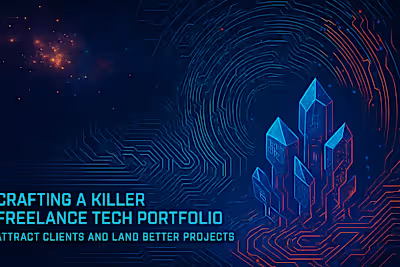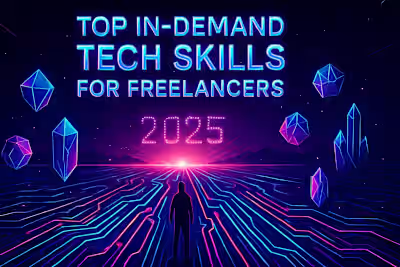The Future of Freelance Tech: Emerging Trends & Opportunities for 2025 and Beyond

The Future of Freelance Tech: Emerging Trends & Opportunities for 2025 and Beyond
The Continued Growth of the Freelance Tech Economy
Statistics and Projections for Freelance Market Growth
Drivers of Freelance Growth (Flexibility, Specialization)
Key Technology Trends Shaping Freelance Opportunities
Artificial Intelligence (AI) and Automation
The Metaverse, Web3, and Decentralized Technologies
Cybersecurity in an Interconnected World
Cloud-Native Development and Edge Computing
Low-Code/No-Code Platforms
Sustainability in Tech (Green Tech)
Evolving Work Models and Client Expectations
Rise of Niche Specializations and Micro-Consulting
Increased Demand for Remote and Global Collaboration
Emphasis on Soft Skills and Business Acumen
Project-Based Engagements vs. Long-Term Partnerships
Preparing for the Future: Strategies for Freelance Tech Professionals
Commitment to Continuous Learning and Upskilling
Building an Adaptable and Diverse Skill Set
Leveraging AI Tools for Productivity and Efficiency
Cultivating a Strong Personal Brand and Network
Focusing on Delivering Measurable Value to Clients
Conclusion
References
The Future of Freelance Tech: Emerging Trends & Opportunities for 2025 and Beyond
The Continued Growth of the Freelance Tech Economy
Statistics and Projections for Freelance Market Growth
Drivers of Freelance Growth (Flexibility, Specialization)
Key Technology Trends Shaping Freelance Opportunities
Artificial Intelligence (AI) and Automation
The Metaverse, Web3, and Decentralized Technologies
Cybersecurity in an Interconnected World
Cloud-Native Development and Edge Computing
Low-Code/No-Code Platforms
Sustainability in Tech (Green Tech)
Evolving Work Models and Client Expectations
Rise of Niche Specializations and Micro-Consulting
Increased Demand for Remote and Global Collaboration
Emphasis on Soft Skills and Business Acumen
Project-Based Engagements vs. Long-Term Partnerships
Preparing for the Future: Strategies for Freelance Tech Professionals
Commitment to Continuous Learning and Upskilling
Building an Adaptable and Diverse Skill Set
Leveraging AI Tools for Productivity and Efficiency
Cultivating a Strong Personal Brand and Network
Focusing on Delivering Measurable Value to Clients
Conclusion
References
Posted Jun 11, 2025
Explore the evolving landscape of freelance tech. Discover key trends, emerging technologies, and strategies to thrive in the future of independent tech work.








